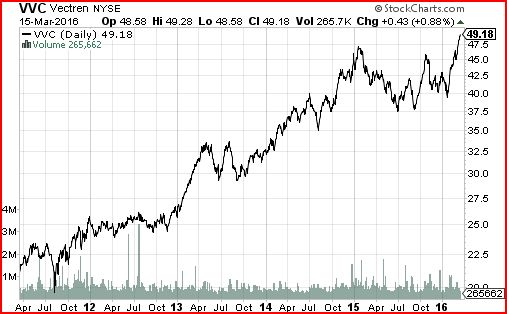Why Dividend-Paying Consumer Stocks Are Worth a Look in This Market
In times like these, the tried and true trump the bold and new.

Profit and prosper with the best of Kiplinger's advice on investing, taxes, retirement, personal finance and much more. Delivered daily. Enter your email in the box and click Sign Me Up.
You are now subscribed
Your newsletter sign-up was successful
Want to add more newsletters?

Delivered daily
Kiplinger Today
Profit and prosper with the best of Kiplinger's advice on investing, taxes, retirement, personal finance and much more delivered daily. Smart money moves start here.

Sent five days a week
Kiplinger A Step Ahead
Get practical help to make better financial decisions in your everyday life, from spending to savings on top deals.

Delivered daily
Kiplinger Closing Bell
Get today's biggest financial and investing headlines delivered to your inbox every day the U.S. stock market is open.

Sent twice a week
Kiplinger Adviser Intel
Financial pros across the country share best practices and fresh tactics to preserve and grow your wealth.

Delivered weekly
Kiplinger Tax Tips
Trim your federal and state tax bills with practical tax-planning and tax-cutting strategies.

Sent twice a week
Kiplinger Retirement Tips
Your twice-a-week guide to planning and enjoying a financially secure and richly rewarding retirement

Sent bimonthly.
Kiplinger Adviser Angle
Insights for advisers, wealth managers and other financial professionals.

Sent twice a week
Kiplinger Investing Weekly
Your twice-a-week roundup of promising stocks, funds, companies and industries you should consider, ones you should avoid, and why.

Sent weekly for six weeks
Kiplinger Invest for Retirement
Your step-by-step six-part series on how to invest for retirement, from devising a successful strategy to exactly which investments to choose.
In case you haven't noticed, there has been a great deal of strength in the stock market during the past month. But the rebound isn’t coming from the market leaders of the past several years. The high-flying growth stocks, especially in the tech sector, and the petroleum and resource stocks that once enjoyed great popularity have let many people down in recent months.
What is holding up well are the mundane stocks that many consider too boring to own, such as food, utilities, and other consumer staples that represent the needs rather than the wants of the population. These are just the type of stocks that we have always highlighted in relation to dividend reinvestment plans (DRIPs), a form of investing that was created out of the strength of well-known consumer brands companies like Procter & Gamble, Colgate-Palmolive and Kimberly-Clark, along with diversified industrials like 3M Company, Boeing and Raytheon. Even in the oil sector, the size and resources of Exxon Mobil make it stand out in sharp contrast to the master limited partnerships (MLPs) that have been decimated.
The stark differences between the tried and true and the bold and new have become obvious and it is the former that is providing comfort to investors while the latter have disappointed.
From just $107.88 $24.99 for Kiplinger Personal Finance
Become a smarter, better informed investor. Subscribe from just $107.88 $24.99, plus get up to 4 Special Issues

Sign up for Kiplinger’s Free Newsletters
Profit and prosper with the best of expert advice on investing, taxes, retirement, personal finance and more - straight to your e-mail.
Profit and prosper with the best of expert advice - straight to your e-mail.
Even within sectors, the differences are clear. While stocks such as Intel, Microsoft and Cisco have become steady dividend payers (and raisers), popular social networking firms such as Facebook and Twitter have seen their weaknesses exposed. Their reliance on being trendy and new, apparent strengths, can vanish overnight. Whether or not the economy slips into recession, the recent weaknesses in the stock market have made it clear that investors need to pay more attention to the differences in these two worlds: the ethereal world of overnight popularity and the tangible world of long-term success created by companies that provide for basic needs.
Our current stock recommendation is Vectren Corp. (symbol VVC). The company was formed when Indiana Energy, which was founded in 1912, merged with SIGCORP in March 2000. It operates in about two-thirds of Indiana, as well as west central Ohio, serving more than one million natural gas and 144,000 electricity customers, and logs about $2.5 billion in annual revenues. Its non-utility group operates in three segments: energy marketing and services; coal mining; and energy infrastructure services. According to Yahoo Finance, consensus estimates call for the company to earn about $2.52 per share this year, up from $2.39 in 2015, and to go on to net about $2.71 per share in 2017. In October, the board of directors approved a boost in the quarterly dividend, from 38 cents to 40 cents per share, marking the 56th consecutive annual increase and providing a 3.3% yield.

What makes Vectren so attractive is that it provides basic natural gas and electric services to a very stable population base in the Midwest, where regulators have been willing to allow reasonable rate increases and a steady rate of return. That has translated into one of the longest streaks of annual dividend increases in the entire country, which shows no sign of ending soon.
The strength of the earnings and dividend growth rests on the simple fact that Vectren provides necessities in the form of heat and electricity that people will pay for no matter what the state of the economy. Even during the most stressful times of recession, utility bills must be paid (and government assistance is generally available to low-income families and individuals, if needed). Although the company lists non-regulated segments such as energy marketing and coal, that part of its business does not create a severe drag on earnings, since it is relatively small in size.
Vectren is just one of a long list of tried and true companies that have routinely raised their dividends year after year. And many of these companies offer investors the opportunity to invest directly in their company-sponsored DRIP without paying any broker commissions or fees of any kind. Here’s a complete listing of No-Fee DRIPs that have raised their dividend payouts for 25+ years.
Ms. Vita Nelson is one of the earliest proponents of dividend reinvestment plans (DRIPs) and a knowledgeable authority on the operations of these plans. She provides financial information centered around DRIP investing at www.drp.com and www.directinvesting.com. She is the Editor and Publisher of Moneypaper's Guide to Direct Investment Plans, Chairman of the Board of Temper of the Times Investor Service, Inc. (a DRIP enrollment service) and co-manager of the MP 63 Fund (DRIPX).
Profit and prosper with the best of Kiplinger's advice on investing, taxes, retirement, personal finance and much more. Delivered daily. Enter your email in the box and click Sign Me Up.

-
 The New Reality for Entertainment
The New Reality for EntertainmentThe Kiplinger Letter The entertainment industry is shifting as movie and TV companies face fierce competition, fight for attention and cope with artificial intelligence.
-
 Stocks Sink With Alphabet, Bitcoin: Stock Market Today
Stocks Sink With Alphabet, Bitcoin: Stock Market TodayA dismal round of jobs data did little to lift sentiment on Thursday.
-
 Betting on Super Bowl 2026? New IRS Tax Changes Could Cost You
Betting on Super Bowl 2026? New IRS Tax Changes Could Cost YouTaxable Income When Super Bowl LX hype fades, some fans may be surprised to learn that sports betting tax rules have shifted.
-
 The 4 Estate Planning Documents Every High-Net-Worth Family Needs (Not Just a Will)
The 4 Estate Planning Documents Every High-Net-Worth Family Needs (Not Just a Will)The key to successful estate planning for HNW families isn't just drafting these four documents, but ensuring they're current and immediately accessible.
-
 Love and Legacy: What Couples Rarely Talk About (But Should)
Love and Legacy: What Couples Rarely Talk About (But Should)Couples who talk openly about finances, including estate planning, are more likely to head into retirement joyfully. How can you get the conversation going?
-
 How to Get the Fair Value for Your Shares When You Are in the Minority Vote on a Sale of Substantially All Corporate Assets
How to Get the Fair Value for Your Shares When You Are in the Minority Vote on a Sale of Substantially All Corporate AssetsWhen a sale of substantially all corporate assets is approved by majority vote, shareholders on the losing side of the vote should understand their rights.
-
 How to Add a Pet Trust to Your Estate Plan: Don't Leave Your Best Friend to Chance
How to Add a Pet Trust to Your Estate Plan: Don't Leave Your Best Friend to ChanceAdding a pet trust to your estate plan can ensure your pets are properly looked after when you're no longer able to care for them. This is how to go about it.
-
 Want to Avoid Leaving Chaos in Your Wake? Don't Leave Behind an Outdated Estate Plan
Want to Avoid Leaving Chaos in Your Wake? Don't Leave Behind an Outdated Estate PlanAn outdated or incomplete estate plan could cause confusion for those handling your affairs at a difficult time. This guide highlights what to update and when.
-
 I'm a Financial Adviser: This Is Why I Became an Advocate for Fee-Only Financial Advice
I'm a Financial Adviser: This Is Why I Became an Advocate for Fee-Only Financial AdviceCan financial advisers who earn commissions on product sales give clients the best advice? For one professional, changing track was the clear choice.
-
 I Met With 100-Plus Advisers to Develop This Road Map for Adopting AI
I Met With 100-Plus Advisers to Develop This Road Map for Adopting AIFor financial advisers eager to embrace AI but unsure where to start, this road map will help you integrate the right tools and safeguards into your work.
-
 The Referral Revolution: How to Grow Your Business With Trust
The Referral Revolution: How to Grow Your Business With TrustYou can attract ideal clients by focusing on value and leveraging your current relationships to create a referral-based practice.